Research Project: Talent Management Strategies in Travel & Tourism
VerifiedAdded on 2023/01/11
|15
|2665
|84
Project
AI Summary
This research project investigates effective talent management strategies within the travel and tourism sector, specifically focusing on VisitBritain. The project begins with an overview of talent management, project aims, objectives, and a detailed project management plan, including a work breakdown structure and Gantt chart. The methodology encompasses both primary and secondary research, with data collection methods including questionnaires and interviews. The research explores the role of talent management in organizational growth and employee satisfaction. Findings are presented through data analysis, including thematic and content analysis of qualitative and quantitative data. The project concludes with recommendations for VisitBritain, an evaluation of the research tools and techniques, and a reflection on the learning process and project outcomes. The project aims to identify effective talent management strategies and their impact on employee job satisfaction within a travel and tourism context.
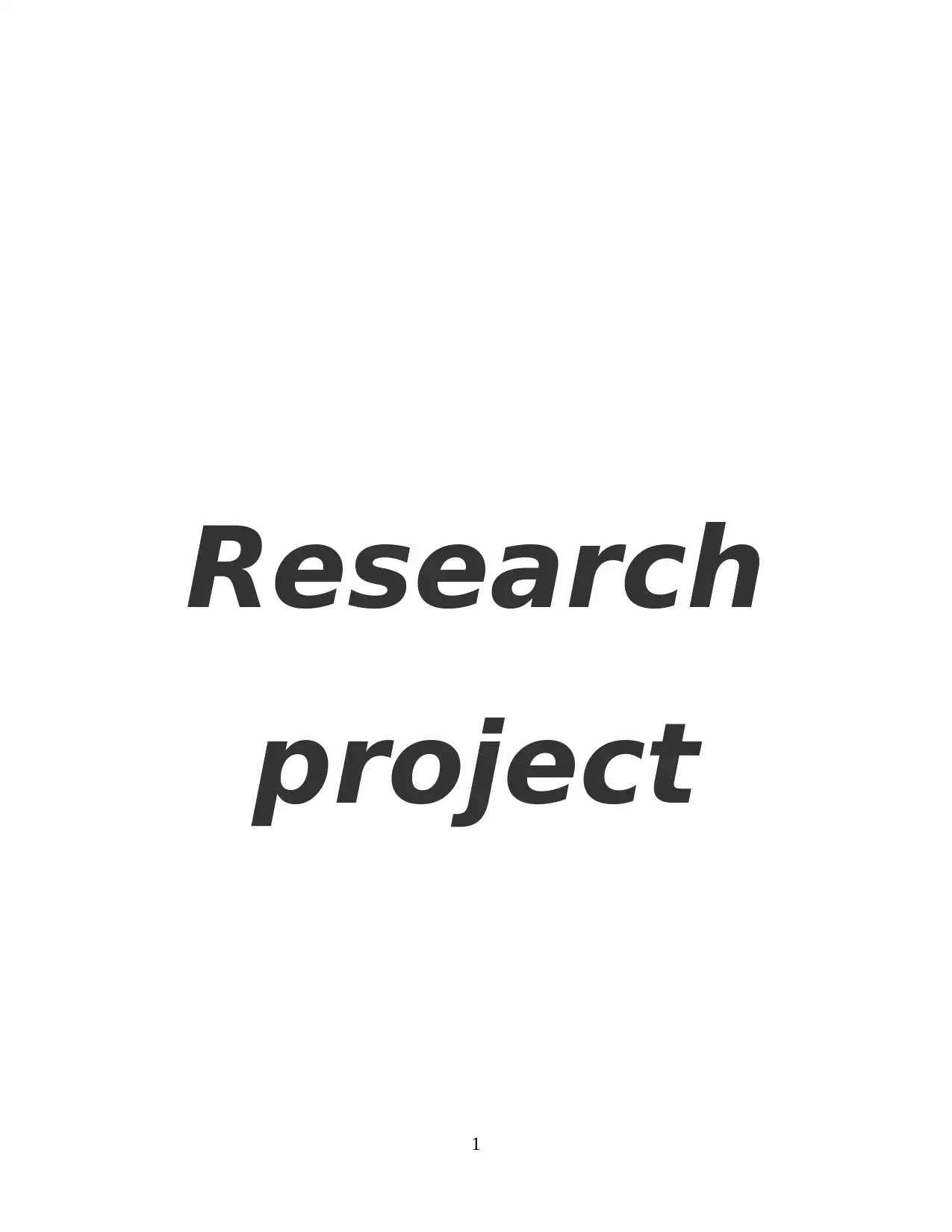
Research
project
1
project
1
Paraphrase This Document
Need a fresh take? Get an instant paraphrase of this document with our AI Paraphraser
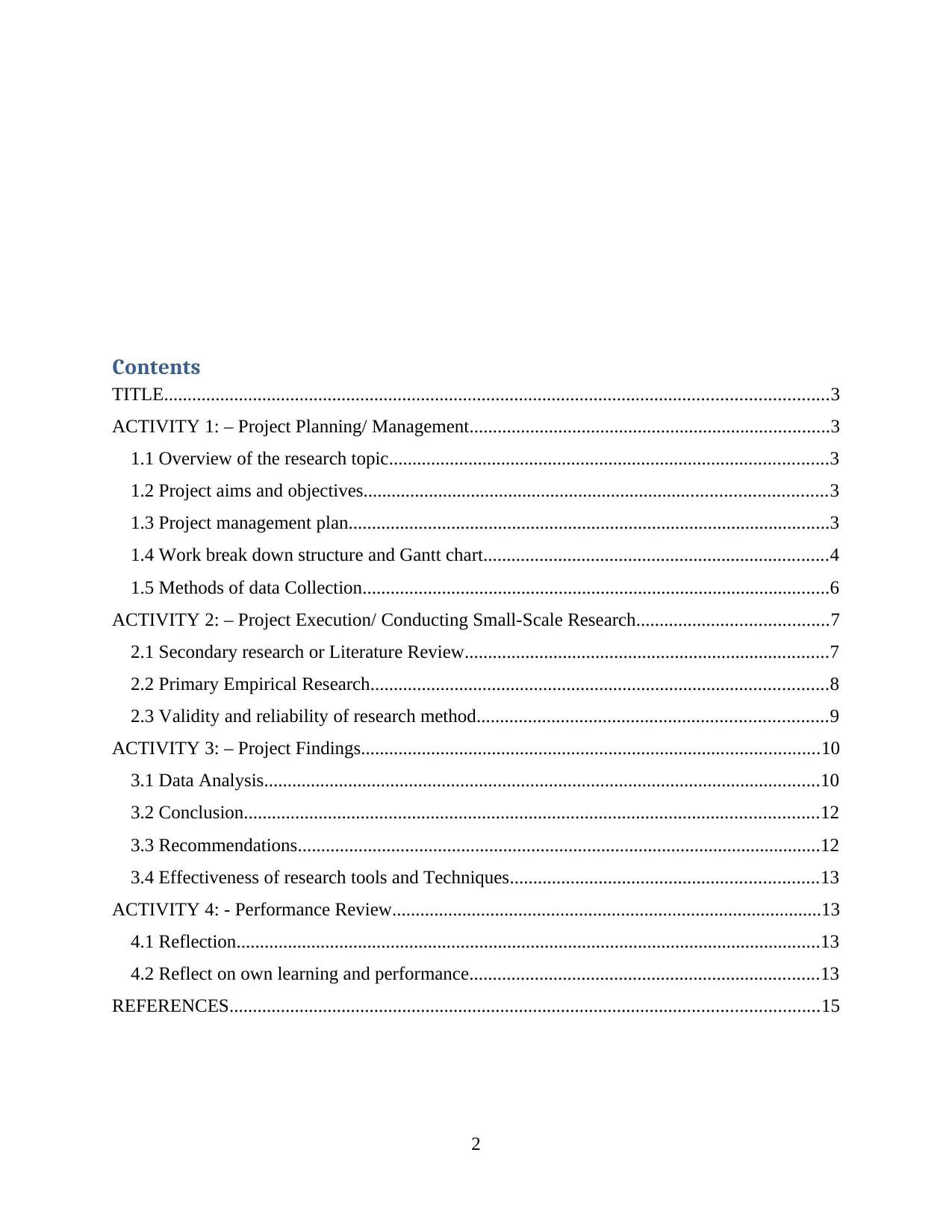
Contents
TITLE..............................................................................................................................................3
ACTIVITY 1: – Project Planning/ Management.............................................................................3
1.1 Overview of the research topic..............................................................................................3
1.2 Project aims and objectives...................................................................................................3
1.3 Project management plan.......................................................................................................3
1.4 Work break down structure and Gantt chart..........................................................................4
1.5 Methods of data Collection....................................................................................................6
ACTIVITY 2: – Project Execution/ Conducting Small-Scale Research.........................................7
2.1 Secondary research or Literature Review..............................................................................7
2.2 Primary Empirical Research..................................................................................................8
2.3 Validity and reliability of research method...........................................................................9
ACTIVITY 3: – Project Findings..................................................................................................10
3.1 Data Analysis.......................................................................................................................10
3.2 Conclusion...........................................................................................................................12
3.3 Recommendations................................................................................................................12
3.4 Effectiveness of research tools and Techniques..................................................................13
ACTIVITY 4: - Performance Review............................................................................................13
4.1 Reflection.............................................................................................................................13
4.2 Reflect on own learning and performance...........................................................................13
REFERENCES..............................................................................................................................15
2
TITLE..............................................................................................................................................3
ACTIVITY 1: – Project Planning/ Management.............................................................................3
1.1 Overview of the research topic..............................................................................................3
1.2 Project aims and objectives...................................................................................................3
1.3 Project management plan.......................................................................................................3
1.4 Work break down structure and Gantt chart..........................................................................4
1.5 Methods of data Collection....................................................................................................6
ACTIVITY 2: – Project Execution/ Conducting Small-Scale Research.........................................7
2.1 Secondary research or Literature Review..............................................................................7
2.2 Primary Empirical Research..................................................................................................8
2.3 Validity and reliability of research method...........................................................................9
ACTIVITY 3: – Project Findings..................................................................................................10
3.1 Data Analysis.......................................................................................................................10
3.2 Conclusion...........................................................................................................................12
3.3 Recommendations................................................................................................................12
3.4 Effectiveness of research tools and Techniques..................................................................13
ACTIVITY 4: - Performance Review............................................................................................13
4.1 Reflection.............................................................................................................................13
4.2 Reflect on own learning and performance...........................................................................13
REFERENCES..............................................................................................................................15
2
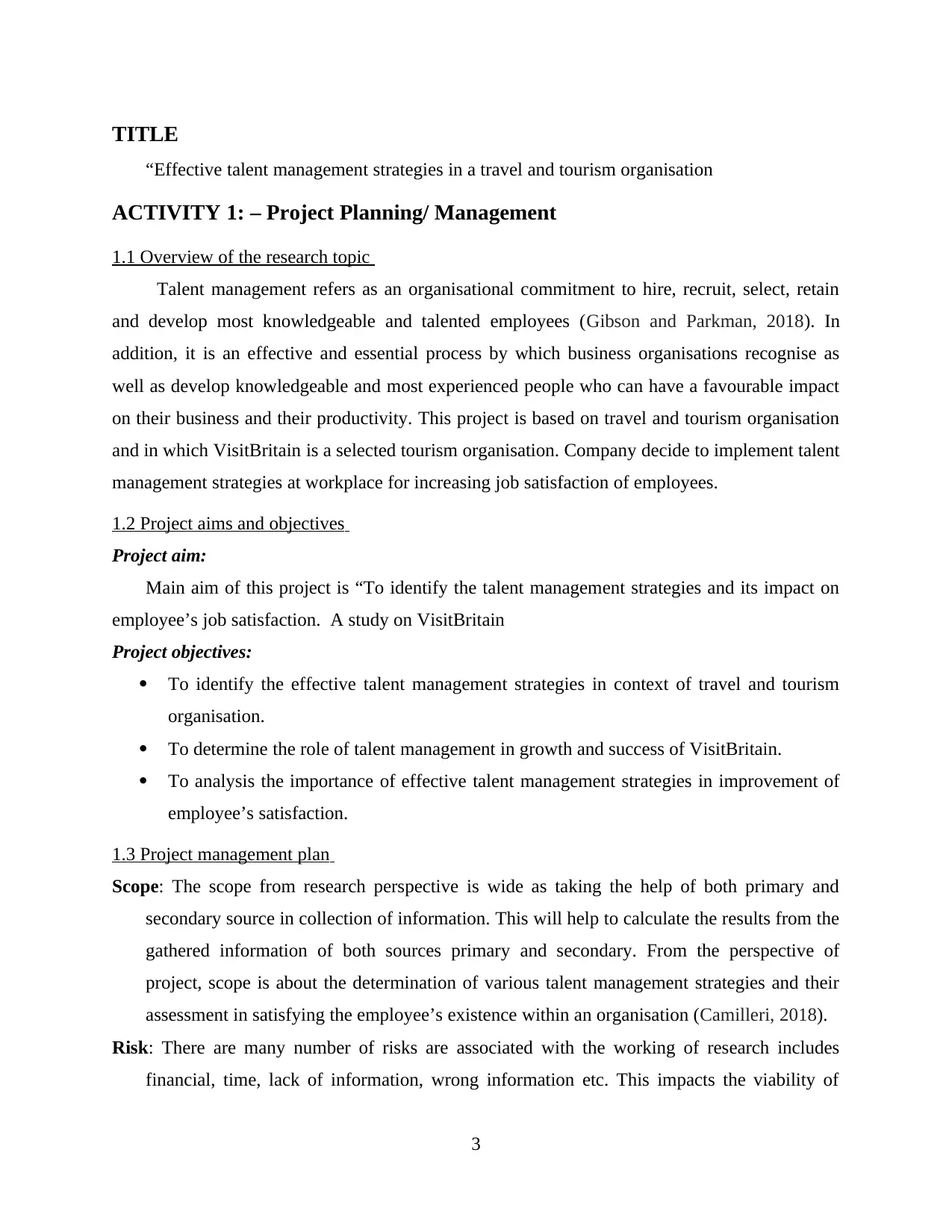
TITLE
“Effective talent management strategies in a travel and tourism organisation
ACTIVITY 1: – Project Planning/ Management
1.1 Overview of the research topic
Talent management refers as an organisational commitment to hire, recruit, select, retain
and develop most knowledgeable and talented employees (Gibson and Parkman, 2018). In
addition, it is an effective and essential process by which business organisations recognise as
well as develop knowledgeable and most experienced people who can have a favourable impact
on their business and their productivity. This project is based on travel and tourism organisation
and in which VisitBritain is a selected tourism organisation. Company decide to implement talent
management strategies at workplace for increasing job satisfaction of employees.
1.2 Project aims and objectives
Project aim:
Main aim of this project is “To identify the talent management strategies and its impact on
employee’s job satisfaction. A study on VisitBritain
Project objectives:
To identify the effective talent management strategies in context of travel and tourism
organisation.
To determine the role of talent management in growth and success of VisitBritain.
To analysis the importance of effective talent management strategies in improvement of
employee’s satisfaction.
1.3 Project management plan
Scope: The scope from research perspective is wide as taking the help of both primary and
secondary source in collection of information. This will help to calculate the results from the
gathered information of both sources primary and secondary. From the perspective of
project, scope is about the determination of various talent management strategies and their
assessment in satisfying the employee’s existence within an organisation (Camilleri, 2018).
Risk: There are many number of risks are associated with the working of research includes
financial, time, lack of information, wrong information etc. This impacts the viability of
3
“Effective talent management strategies in a travel and tourism organisation
ACTIVITY 1: – Project Planning/ Management
1.1 Overview of the research topic
Talent management refers as an organisational commitment to hire, recruit, select, retain
and develop most knowledgeable and talented employees (Gibson and Parkman, 2018). In
addition, it is an effective and essential process by which business organisations recognise as
well as develop knowledgeable and most experienced people who can have a favourable impact
on their business and their productivity. This project is based on travel and tourism organisation
and in which VisitBritain is a selected tourism organisation. Company decide to implement talent
management strategies at workplace for increasing job satisfaction of employees.
1.2 Project aims and objectives
Project aim:
Main aim of this project is “To identify the talent management strategies and its impact on
employee’s job satisfaction. A study on VisitBritain
Project objectives:
To identify the effective talent management strategies in context of travel and tourism
organisation.
To determine the role of talent management in growth and success of VisitBritain.
To analysis the importance of effective talent management strategies in improvement of
employee’s satisfaction.
1.3 Project management plan
Scope: The scope from research perspective is wide as taking the help of both primary and
secondary source in collection of information. This will help to calculate the results from the
gathered information of both sources primary and secondary. From the perspective of
project, scope is about the determination of various talent management strategies and their
assessment in satisfying the employee’s existence within an organisation (Camilleri, 2018).
Risk: There are many number of risks are associated with the working of research includes
financial, time, lack of information, wrong information etc. This impacts the viability of
3
⊘ This is a preview!⊘
Do you want full access?
Subscribe today to unlock all pages.

Trusted by 1+ million students worldwide
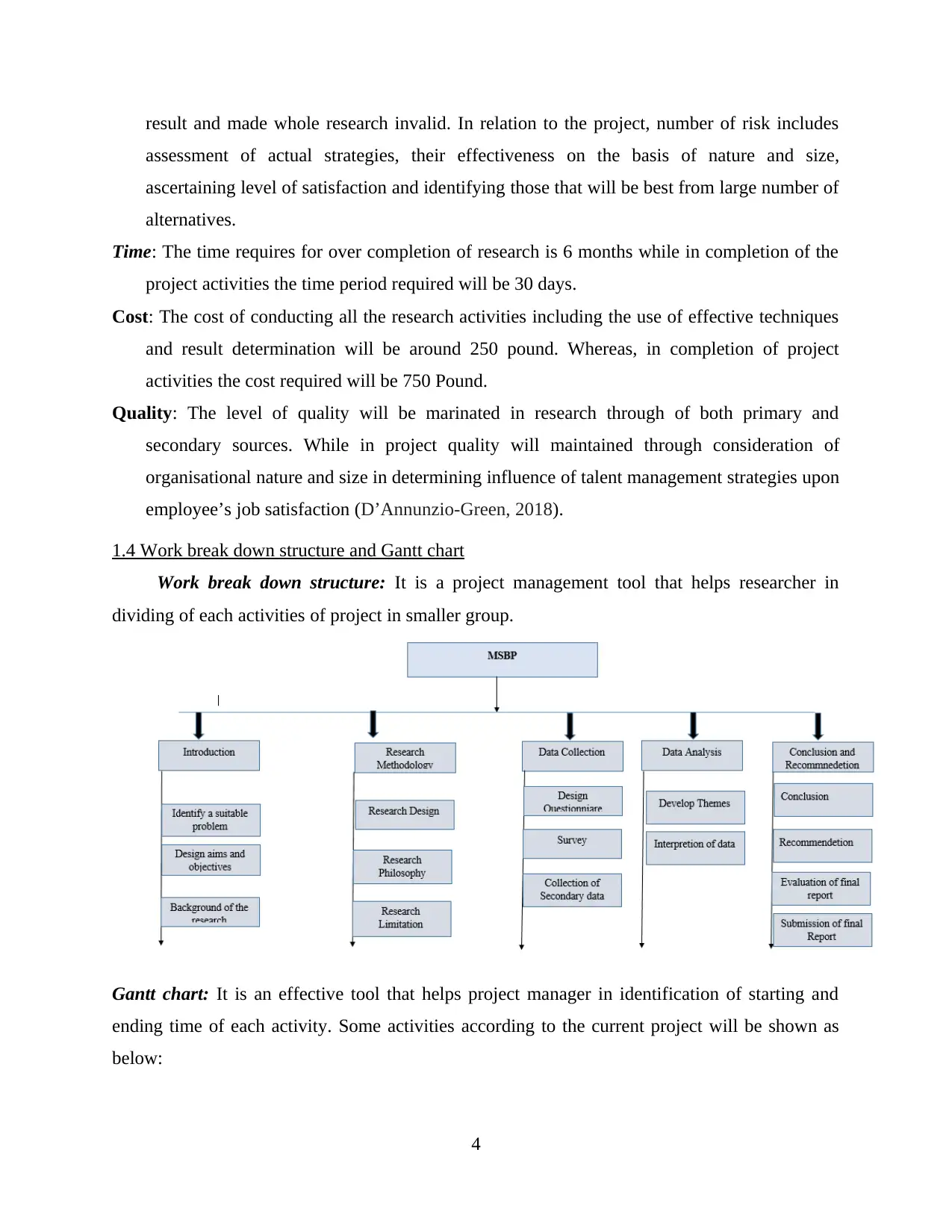
result and made whole research invalid. In relation to the project, number of risk includes
assessment of actual strategies, their effectiveness on the basis of nature and size,
ascertaining level of satisfaction and identifying those that will be best from large number of
alternatives.
Time: The time requires for over completion of research is 6 months while in completion of the
project activities the time period required will be 30 days.
Cost: The cost of conducting all the research activities including the use of effective techniques
and result determination will be around 250 pound. Whereas, in completion of project
activities the cost required will be 750 Pound.
Quality: The level of quality will be marinated in research through of both primary and
secondary sources. While in project quality will maintained through consideration of
organisational nature and size in determining influence of talent management strategies upon
employee’s job satisfaction (D’Annunzio-Green, 2018).
1.4 Work break down structure and Gantt chart
Work break down structure: It is a project management tool that helps researcher in
dividing of each activities of project in smaller group.
Gantt chart: It is an effective tool that helps project manager in identification of starting and
ending time of each activity. Some activities according to the current project will be shown as
below:
4
assessment of actual strategies, their effectiveness on the basis of nature and size,
ascertaining level of satisfaction and identifying those that will be best from large number of
alternatives.
Time: The time requires for over completion of research is 6 months while in completion of the
project activities the time period required will be 30 days.
Cost: The cost of conducting all the research activities including the use of effective techniques
and result determination will be around 250 pound. Whereas, in completion of project
activities the cost required will be 750 Pound.
Quality: The level of quality will be marinated in research through of both primary and
secondary sources. While in project quality will maintained through consideration of
organisational nature and size in determining influence of talent management strategies upon
employee’s job satisfaction (D’Annunzio-Green, 2018).
1.4 Work break down structure and Gantt chart
Work break down structure: It is a project management tool that helps researcher in
dividing of each activities of project in smaller group.
Gantt chart: It is an effective tool that helps project manager in identification of starting and
ending time of each activity. Some activities according to the current project will be shown as
below:
4
Paraphrase This Document
Need a fresh take? Get an instant paraphrase of this document with our AI Paraphraser
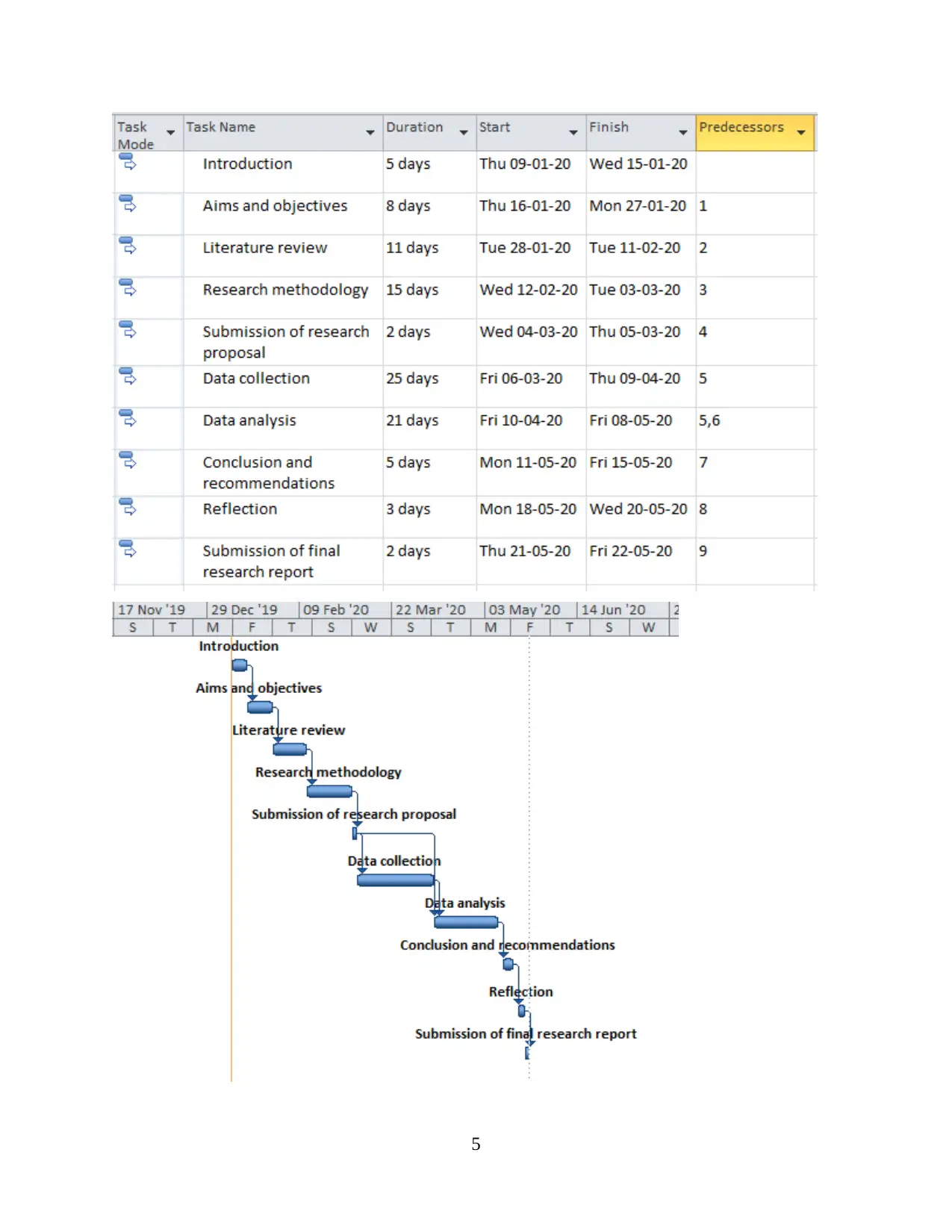
5
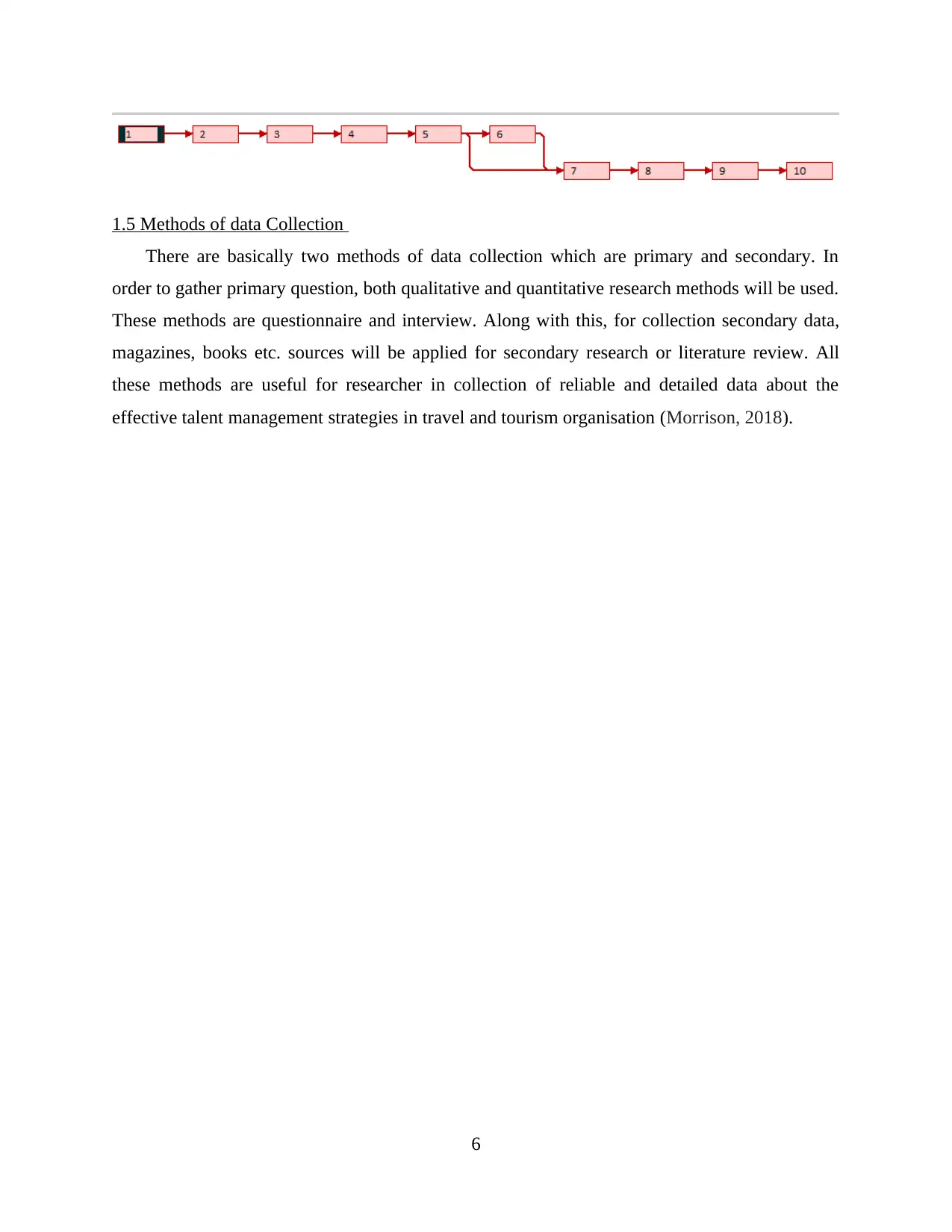
1.5 Methods of data Collection
There are basically two methods of data collection which are primary and secondary. In
order to gather primary question, both qualitative and quantitative research methods will be used.
These methods are questionnaire and interview. Along with this, for collection secondary data,
magazines, books etc. sources will be applied for secondary research or literature review. All
these methods are useful for researcher in collection of reliable and detailed data about the
effective talent management strategies in travel and tourism organisation (Morrison, 2018).
6
There are basically two methods of data collection which are primary and secondary. In
order to gather primary question, both qualitative and quantitative research methods will be used.
These methods are questionnaire and interview. Along with this, for collection secondary data,
magazines, books etc. sources will be applied for secondary research or literature review. All
these methods are useful for researcher in collection of reliable and detailed data about the
effective talent management strategies in travel and tourism organisation (Morrison, 2018).
6
⊘ This is a preview!⊘
Do you want full access?
Subscribe today to unlock all pages.

Trusted by 1+ million students worldwide
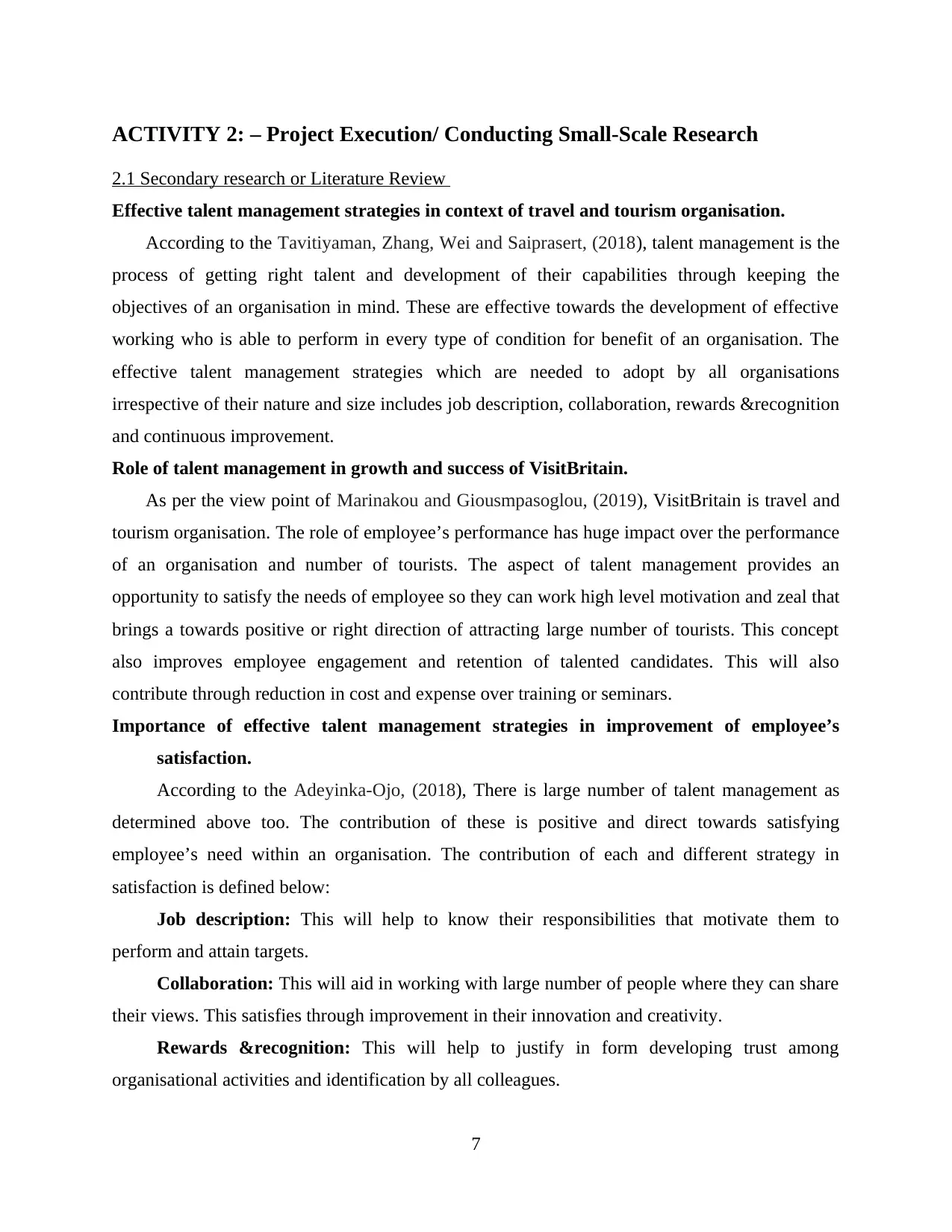
ACTIVITY 2: – Project Execution/ Conducting Small-Scale Research
2.1 Secondary research or Literature Review
Effective talent management strategies in context of travel and tourism organisation.
According to the Tavitiyaman, Zhang, Wei and Saiprasert, (2018), talent management is the
process of getting right talent and development of their capabilities through keeping the
objectives of an organisation in mind. These are effective towards the development of effective
working who is able to perform in every type of condition for benefit of an organisation. The
effective talent management strategies which are needed to adopt by all organisations
irrespective of their nature and size includes job description, collaboration, rewards &recognition
and continuous improvement.
Role of talent management in growth and success of VisitBritain.
As per the view point of Marinakou and Giousmpasoglou, (2019), VisitBritain is travel and
tourism organisation. The role of employee’s performance has huge impact over the performance
of an organisation and number of tourists. The aspect of talent management provides an
opportunity to satisfy the needs of employee so they can work high level motivation and zeal that
brings a towards positive or right direction of attracting large number of tourists. This concept
also improves employee engagement and retention of talented candidates. This will also
contribute through reduction in cost and expense over training or seminars.
Importance of effective talent management strategies in improvement of employee’s
satisfaction.
According to the Adeyinka-Ojo, (2018), There is large number of talent management as
determined above too. The contribution of these is positive and direct towards satisfying
employee’s need within an organisation. The contribution of each and different strategy in
satisfaction is defined below:
Job description: This will help to know their responsibilities that motivate them to
perform and attain targets.
Collaboration: This will aid in working with large number of people where they can share
their views. This satisfies through improvement in their innovation and creativity.
Rewards &recognition: This will help to justify in form developing trust among
organisational activities and identification by all colleagues.
7
2.1 Secondary research or Literature Review
Effective talent management strategies in context of travel and tourism organisation.
According to the Tavitiyaman, Zhang, Wei and Saiprasert, (2018), talent management is the
process of getting right talent and development of their capabilities through keeping the
objectives of an organisation in mind. These are effective towards the development of effective
working who is able to perform in every type of condition for benefit of an organisation. The
effective talent management strategies which are needed to adopt by all organisations
irrespective of their nature and size includes job description, collaboration, rewards &recognition
and continuous improvement.
Role of talent management in growth and success of VisitBritain.
As per the view point of Marinakou and Giousmpasoglou, (2019), VisitBritain is travel and
tourism organisation. The role of employee’s performance has huge impact over the performance
of an organisation and number of tourists. The aspect of talent management provides an
opportunity to satisfy the needs of employee so they can work high level motivation and zeal that
brings a towards positive or right direction of attracting large number of tourists. This concept
also improves employee engagement and retention of talented candidates. This will also
contribute through reduction in cost and expense over training or seminars.
Importance of effective talent management strategies in improvement of employee’s
satisfaction.
According to the Adeyinka-Ojo, (2018), There is large number of talent management as
determined above too. The contribution of these is positive and direct towards satisfying
employee’s need within an organisation. The contribution of each and different strategy in
satisfaction is defined below:
Job description: This will help to know their responsibilities that motivate them to
perform and attain targets.
Collaboration: This will aid in working with large number of people where they can share
their views. This satisfies through improvement in their innovation and creativity.
Rewards &recognition: This will help to justify in form developing trust among
organisational activities and identification by all colleagues.
7
Paraphrase This Document
Need a fresh take? Get an instant paraphrase of this document with our AI Paraphraser
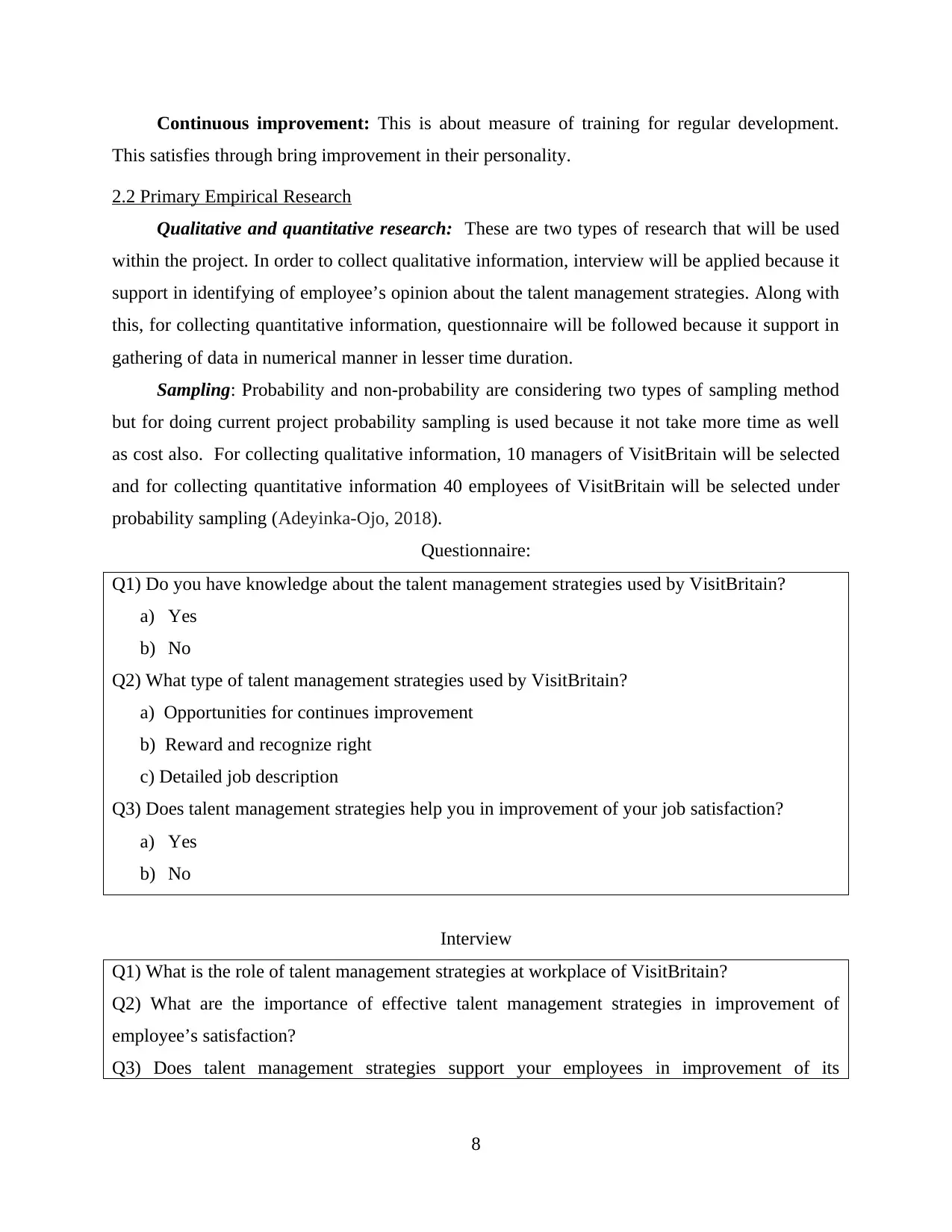
Continuous improvement: This is about measure of training for regular development.
This satisfies through bring improvement in their personality.
2.2 Primary Empirical Research
Qualitative and quantitative research: These are two types of research that will be used
within the project. In order to collect qualitative information, interview will be applied because it
support in identifying of employee’s opinion about the talent management strategies. Along with
this, for collecting quantitative information, questionnaire will be followed because it support in
gathering of data in numerical manner in lesser time duration.
Sampling: Probability and non-probability are considering two types of sampling method
but for doing current project probability sampling is used because it not take more time as well
as cost also. For collecting qualitative information, 10 managers of VisitBritain will be selected
and for collecting quantitative information 40 employees of VisitBritain will be selected under
probability sampling (Adeyinka-Ojo, 2018).
Questionnaire:
Q1) Do you have knowledge about the talent management strategies used by VisitBritain?
a) Yes
b) No
Q2) What type of talent management strategies used by VisitBritain?
a) Opportunities for continues improvement
b) Reward and recognize right
c) Detailed job description
Q3) Does talent management strategies help you in improvement of your job satisfaction?
a) Yes
b) No
Interview
Q1) What is the role of talent management strategies at workplace of VisitBritain?
Q2) What are the importance of effective talent management strategies in improvement of
employee’s satisfaction?
Q3) Does talent management strategies support your employees in improvement of its
8
This satisfies through bring improvement in their personality.
2.2 Primary Empirical Research
Qualitative and quantitative research: These are two types of research that will be used
within the project. In order to collect qualitative information, interview will be applied because it
support in identifying of employee’s opinion about the talent management strategies. Along with
this, for collecting quantitative information, questionnaire will be followed because it support in
gathering of data in numerical manner in lesser time duration.
Sampling: Probability and non-probability are considering two types of sampling method
but for doing current project probability sampling is used because it not take more time as well
as cost also. For collecting qualitative information, 10 managers of VisitBritain will be selected
and for collecting quantitative information 40 employees of VisitBritain will be selected under
probability sampling (Adeyinka-Ojo, 2018).
Questionnaire:
Q1) Do you have knowledge about the talent management strategies used by VisitBritain?
a) Yes
b) No
Q2) What type of talent management strategies used by VisitBritain?
a) Opportunities for continues improvement
b) Reward and recognize right
c) Detailed job description
Q3) Does talent management strategies help you in improvement of your job satisfaction?
a) Yes
b) No
Interview
Q1) What is the role of talent management strategies at workplace of VisitBritain?
Q2) What are the importance of effective talent management strategies in improvement of
employee’s satisfaction?
Q3) Does talent management strategies support your employees in improvement of its
8
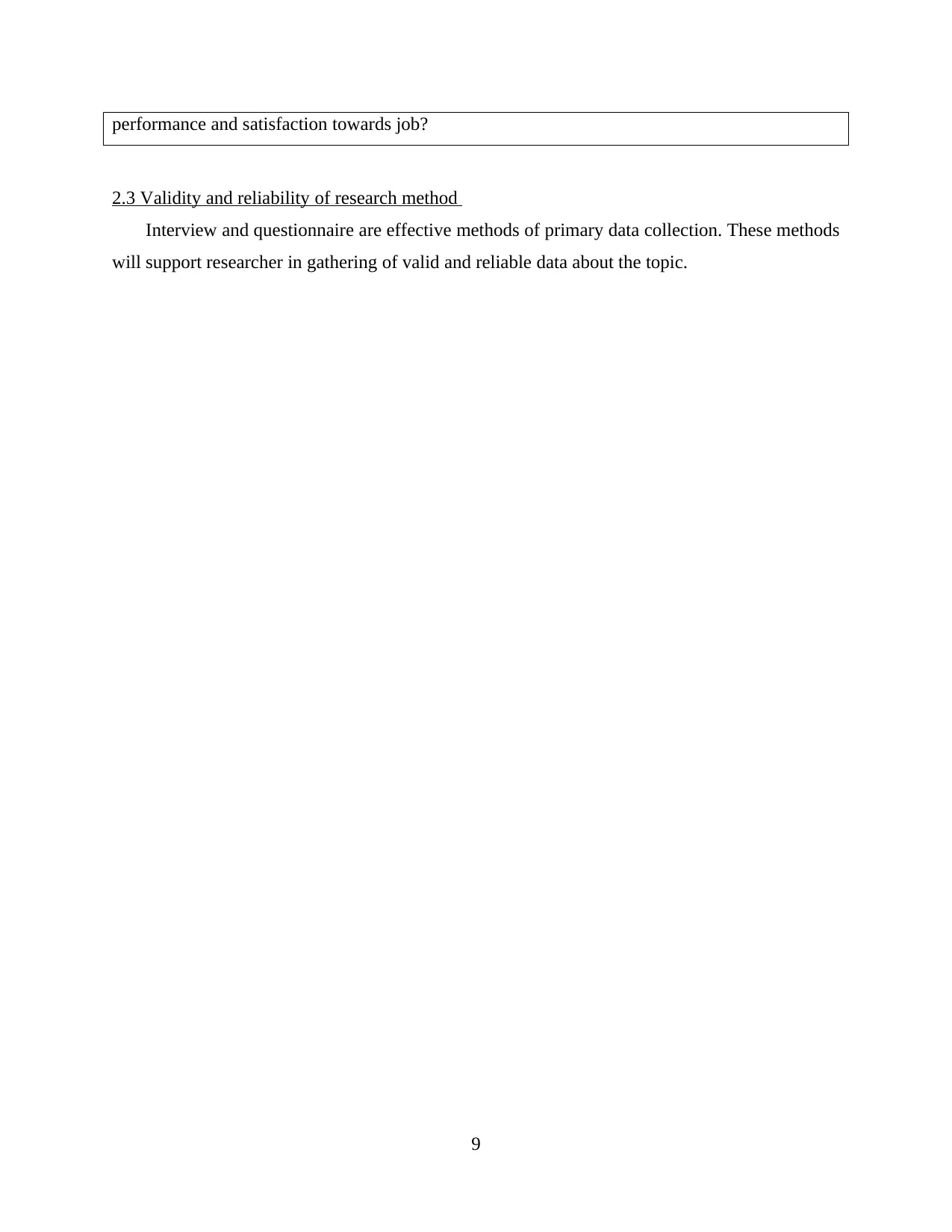
performance and satisfaction towards job?
2.3 Validity and reliability of research method
Interview and questionnaire are effective methods of primary data collection. These methods
will support researcher in gathering of valid and reliable data about the topic.
9
2.3 Validity and reliability of research method
Interview and questionnaire are effective methods of primary data collection. These methods
will support researcher in gathering of valid and reliable data about the topic.
9
⊘ This is a preview!⊘
Do you want full access?
Subscribe today to unlock all pages.

Trusted by 1+ million students worldwide
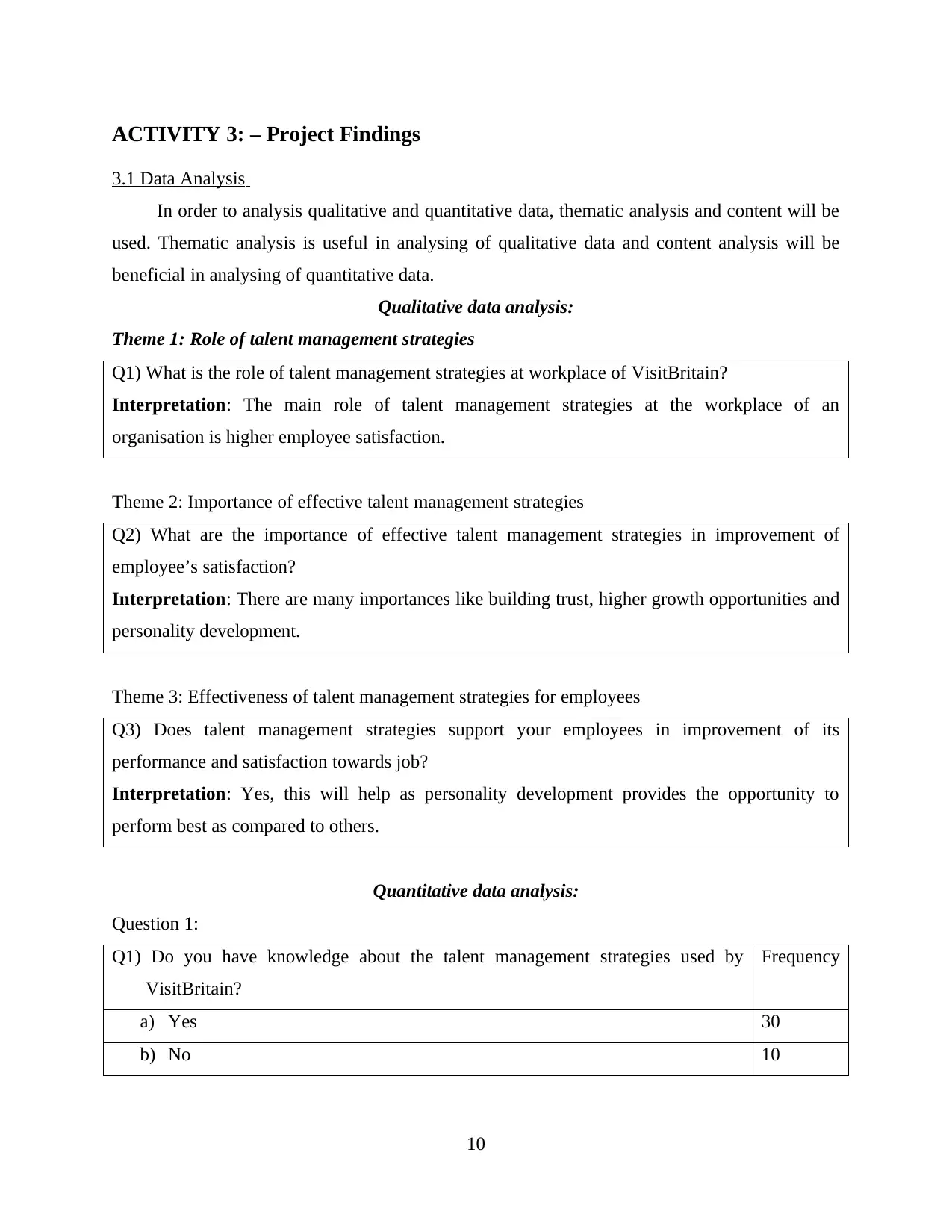
ACTIVITY 3: – Project Findings
3.1 Data Analysis
In order to analysis qualitative and quantitative data, thematic analysis and content will be
used. Thematic analysis is useful in analysing of qualitative data and content analysis will be
beneficial in analysing of quantitative data.
Qualitative data analysis:
Theme 1: Role of talent management strategies
Q1) What is the role of talent management strategies at workplace of VisitBritain?
Interpretation: The main role of talent management strategies at the workplace of an
organisation is higher employee satisfaction.
Theme 2: Importance of effective talent management strategies
Q2) What are the importance of effective talent management strategies in improvement of
employee’s satisfaction?
Interpretation: There are many importances like building trust, higher growth opportunities and
personality development.
Theme 3: Effectiveness of talent management strategies for employees
Q3) Does talent management strategies support your employees in improvement of its
performance and satisfaction towards job?
Interpretation: Yes, this will help as personality development provides the opportunity to
perform best as compared to others.
Quantitative data analysis:
Question 1:
Q1) Do you have knowledge about the talent management strategies used by
VisitBritain?
Frequency
a) Yes 30
b) No 10
10
3.1 Data Analysis
In order to analysis qualitative and quantitative data, thematic analysis and content will be
used. Thematic analysis is useful in analysing of qualitative data and content analysis will be
beneficial in analysing of quantitative data.
Qualitative data analysis:
Theme 1: Role of talent management strategies
Q1) What is the role of talent management strategies at workplace of VisitBritain?
Interpretation: The main role of talent management strategies at the workplace of an
organisation is higher employee satisfaction.
Theme 2: Importance of effective talent management strategies
Q2) What are the importance of effective talent management strategies in improvement of
employee’s satisfaction?
Interpretation: There are many importances like building trust, higher growth opportunities and
personality development.
Theme 3: Effectiveness of talent management strategies for employees
Q3) Does talent management strategies support your employees in improvement of its
performance and satisfaction towards job?
Interpretation: Yes, this will help as personality development provides the opportunity to
perform best as compared to others.
Quantitative data analysis:
Question 1:
Q1) Do you have knowledge about the talent management strategies used by
VisitBritain?
Frequency
a) Yes 30
b) No 10
10
Paraphrase This Document
Need a fresh take? Get an instant paraphrase of this document with our AI Paraphraser
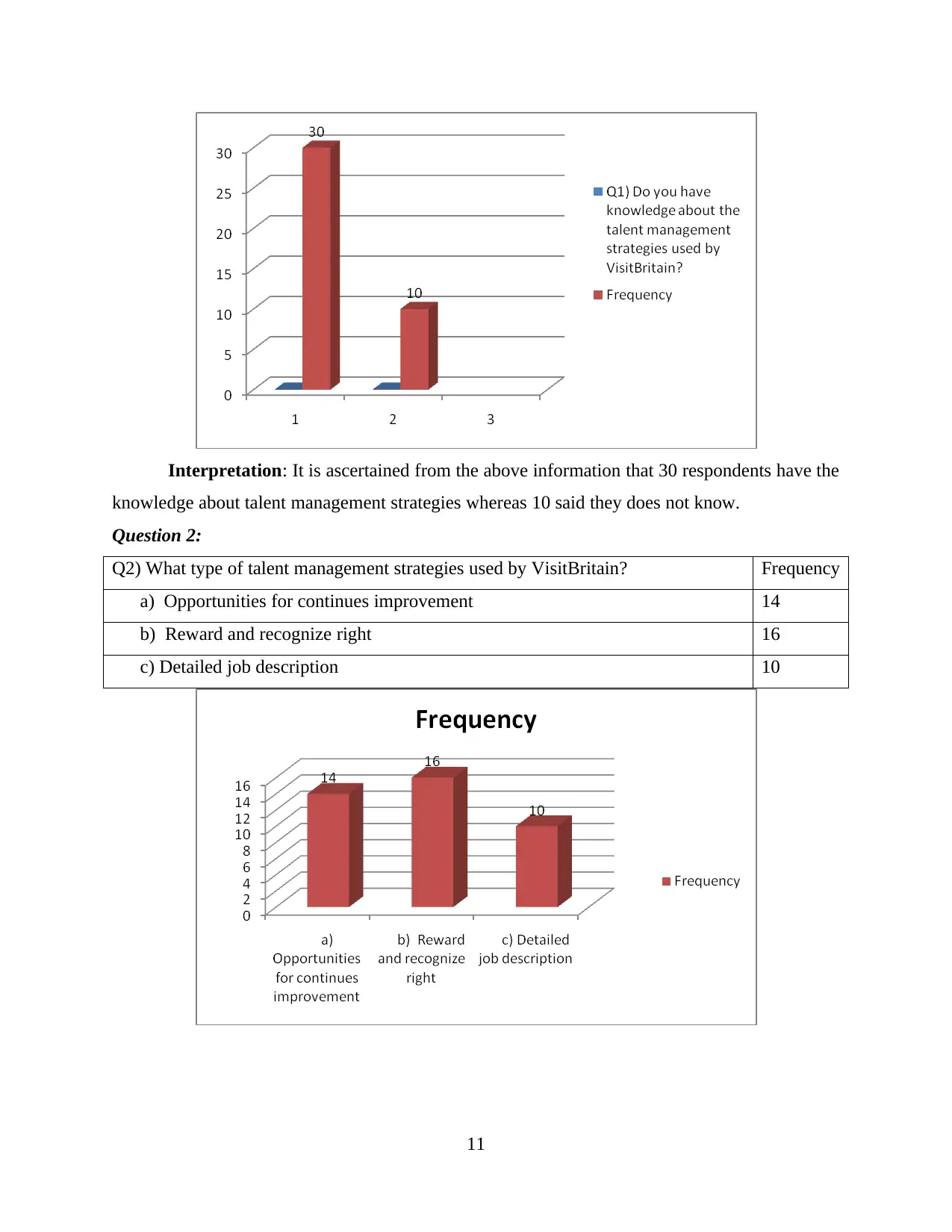
Interpretation: It is ascertained from the above information that 30 respondents have the
knowledge about talent management strategies whereas 10 said they does not know.
Question 2:
Q2) What type of talent management strategies used by VisitBritain? Frequency
a) Opportunities for continues improvement 14
b) Reward and recognize right 16
c) Detailed job description 10
11
knowledge about talent management strategies whereas 10 said they does not know.
Question 2:
Q2) What type of talent management strategies used by VisitBritain? Frequency
a) Opportunities for continues improvement 14
b) Reward and recognize right 16
c) Detailed job description 10
11
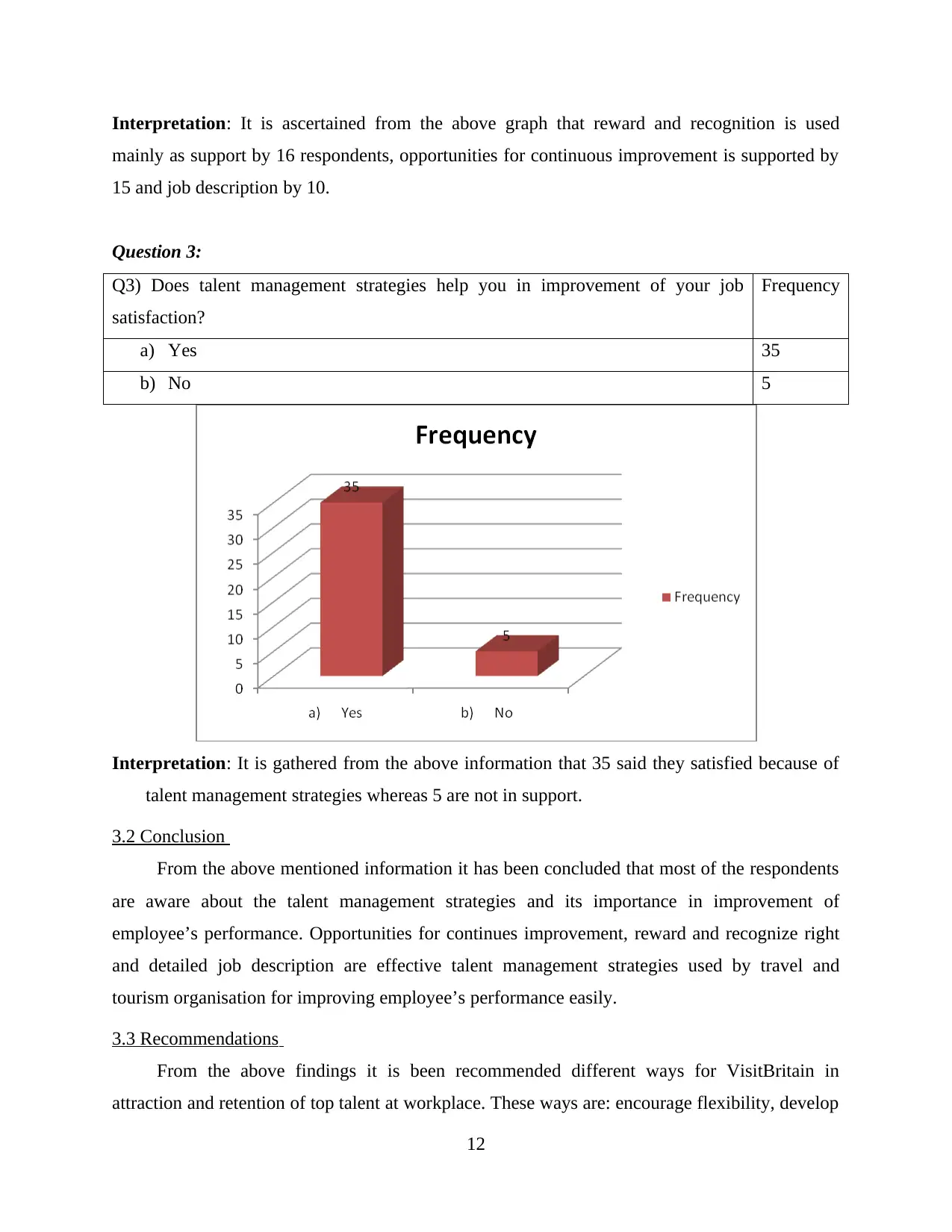
Interpretation: It is ascertained from the above graph that reward and recognition is used
mainly as support by 16 respondents, opportunities for continuous improvement is supported by
15 and job description by 10.
Question 3:
Q3) Does talent management strategies help you in improvement of your job
satisfaction?
Frequency
a) Yes 35
b) No 5
Interpretation: It is gathered from the above information that 35 said they satisfied because of
talent management strategies whereas 5 are not in support.
3.2 Conclusion
From the above mentioned information it has been concluded that most of the respondents
are aware about the talent management strategies and its importance in improvement of
employee’s performance. Opportunities for continues improvement, reward and recognize right
and detailed job description are effective talent management strategies used by travel and
tourism organisation for improving employee’s performance easily.
3.3 Recommendations
From the above findings it is been recommended different ways for VisitBritain in
attraction and retention of top talent at workplace. These ways are: encourage flexibility, develop
12
mainly as support by 16 respondents, opportunities for continuous improvement is supported by
15 and job description by 10.
Question 3:
Q3) Does talent management strategies help you in improvement of your job
satisfaction?
Frequency
a) Yes 35
b) No 5
Interpretation: It is gathered from the above information that 35 said they satisfied because of
talent management strategies whereas 5 are not in support.
3.2 Conclusion
From the above mentioned information it has been concluded that most of the respondents
are aware about the talent management strategies and its importance in improvement of
employee’s performance. Opportunities for continues improvement, reward and recognize right
and detailed job description are effective talent management strategies used by travel and
tourism organisation for improving employee’s performance easily.
3.3 Recommendations
From the above findings it is been recommended different ways for VisitBritain in
attraction and retention of top talent at workplace. These ways are: encourage flexibility, develop
12
⊘ This is a preview!⊘
Do you want full access?
Subscribe today to unlock all pages.

Trusted by 1+ million students worldwide
1 out of 15
Related Documents
Your All-in-One AI-Powered Toolkit for Academic Success.
+13062052269
info@desklib.com
Available 24*7 on WhatsApp / Email
![[object Object]](/_next/static/media/star-bottom.7253800d.svg)
Unlock your academic potential
Copyright © 2020–2025 A2Z Services. All Rights Reserved. Developed and managed by ZUCOL.





